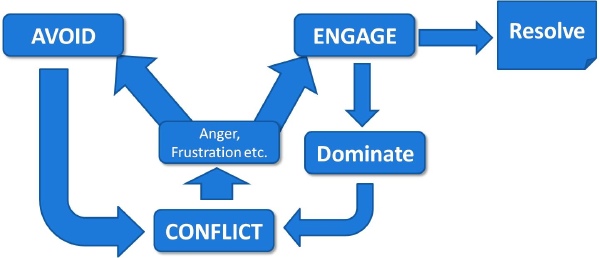
What Do You Do When…?11.19.10
What do you do when you sense conflict in a relationship? Why do you do what you do? I recently attended a seminar where this question was discussed in small groups. Listening to the other three members (Japanese) of my group, I had an “Aha!” moment. My own default is probably some variety of fight (talk to the person about the issue less or more productively, hoping my viewpoint prevails) or flight (ignore and avoid), with a prayer thrown in for good measure. Yet these were the comments from my group:
“Invite the person out for a drink.”
“Find something good about them and compliment them.”
“Try to have lunch together and get to know them better.”
Another member offered this recent experience. “I felt stress recently with someone I work under and it was really bothering me, so I decided to try to get closer to them. I sent an email and asked if there was anything I could do to help with her work. She responded right away and now I don’t feel tension with that person anymore.”
My default responses focus on the problem. I want the problem to disappear, so I do my best to fix it. If that fails, I’m embarrassed to admit that I try to make the person connected with the problem disappear from my life by avoiding them physically if possible, or emotionally if not.
The approach of the Japanese members of this group aimed at strengthening the relationship, at times even ignoring or avoiding the problem. While I felt like saying, “Can’t you see the elephant in the middle of the room? What are you going to do about it?” perhaps they realized that often problems aren’t easily solved, and the relationship is what really matters, not the issue.
Whatever approach we take to conflict is probably conditioned by models we experienced growing up and a background of rarely examined assumptions about reality, relationships, and conflict. So…what do you do when you sense conflict in a relationship, and why?






Before or after I sit on them, pull their hair and make them cry Uncle? snicker
Report This Comment
Posted by Julie on 12/13/09 November 20th, 2010 at 12:00 AM
Yup, that’s just what I feel some of the time, but am not honest enough to say!
Report This Comment
Posted by Andrea Johnson on 12/13/09 November 20th, 2010 at 8:12 AM
Thanks for these thoughts, Andrea! In my small group we have been studying a book on prayer. One of the things we’ve been talking about is how cynicism prevents us from connecting with God because we are always trying to “see through” or “behind” the reason for things in an attempt to protect ourselves–in essence, focusing on the problem and not our relationship with the Father. While this is not completely parallel to your post I was struck by the similarity and also how Jesus, placing his complete trust in the Father, poured himself out in love to establish relationship regardless of the cost to himself. There is enormous power in self-sacrificial love. I think we don’t often imagine what might happen if we responded in love to someone with whom we feel tension, like the person you mentioned who offered to help the other. We’re too consumed with the need to protect ourselves, and the result is the loss of relationship, that for which we were created. Such a good word, Andrea!
Report This Comment
Posted by Myrna Olson on 12/13/09 November 20th, 2010 at 2:42 AM
It’s funny how quickly we get confused, thinking that being “right” is more important than relationship. Perhaps its because real relationship changes us, and change is painful and scary as parts of us die and are transformed. “Consumed with the need to protect ourselves” often describes me even though I’m not always aware of it.
Report This Comment
Posted by Andrea Johnson on 12/13/09 November 20th, 2010 at 8:10 AM
My go to tendency ( no surprise) is to withdraw unless the relationship is an important one then I pray and try to develop the relationship with the enormous help of the Holy Spirit.
Report This Comment
Posted by Ronna on 12/13/09 November 20th, 2010 at 11:04 PM
Withdrawing is really slick, because sometimes the other person doesn’t even notice so it is really safe. How cool that you take the high road and invest yourself even when it is not comfortable. Has it ever backfired?
Report This Comment
Posted by Andrea Johnson on 12/13/09 November 21st, 2010 at 8:27 AM
This has been helpful. Good food for thought!
Report This Comment
Posted by Kristine L on 12/13/09 November 22nd, 2010 at 8:14 AM
As Americans, we have so many relationships by choice, and there are very few where we feel obligated to continue, unlike some cultures. With only 24 hours in each day, we can’t take the time to strengthen each and every relationship where we sense tension or conflict as commentator Ronna hinted. However, for me realizing that not addressing the problem directly (and not withdrawing) but instead intentionally strengthening the relationship can be a proactive stance was a new thought for me.
Report This Comment
Posted by Andrea Johnson on 12/13/09 November 22nd, 2010 at 10:23 AM